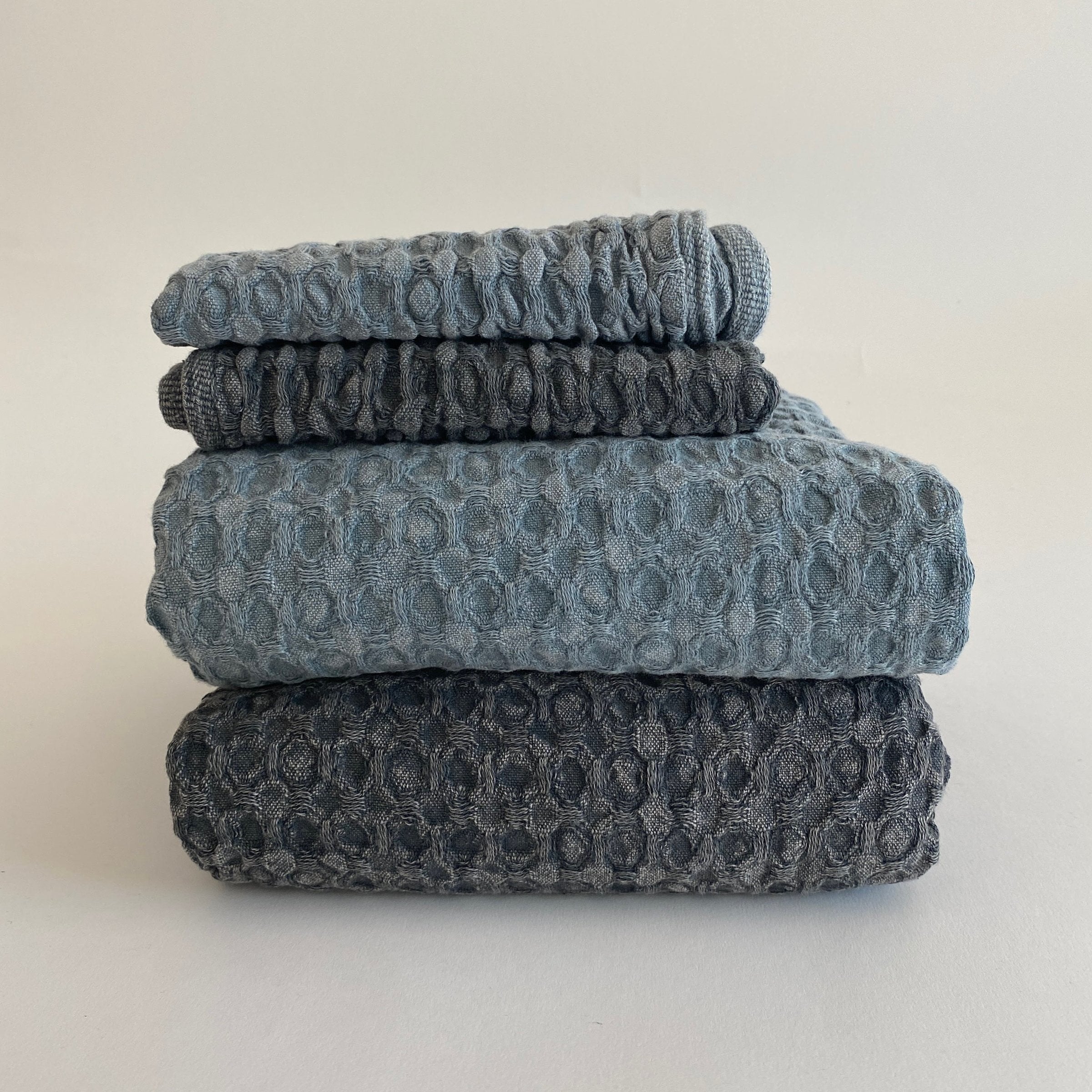How to Wash Towels to Keep Them Soft: The Complete Guide
There's nothing quite like wrapping yourself in a plush, soft towel after a relaxing shower. But over time, even the fluffiest towels can become stiff, scratchy, and less absorbent. The good news? With the right washing techniques, you can keep your towels feeling luxuriously soft for years to come.
In this comprehensive guide, we'll walk you through expert-approved methods to maintain towel softness, tackle common laundry mistakes, and answer all your burning questions about towel care.
How to Wash Towels to Keep Them Soft in Washing Machine
The key to maintaining soft towels starts with your washing machine routine. Here's the step-by-step process:
Temperature matters: Wash towels in warm water (not hot) to effectively clean them without damaging the fibers. Hot water can break down the cotton fibers over time, leading to roughness and reduced absorbency.
Don't overload: Give your towels room to move freely in the drum. Overloading prevents proper rinsing and leaves detergent residue that makes towels stiff and scratchy.
Use less detergent: This is perhaps the most critical mistake people make. Most of us use far too much detergent. Start with half the recommended amount—excess detergent builds up in towel fibers, creating that cardboard-like texture nobody wants.
Skip the fabric softener: While it seems counterintuitive, fabric softener actually coats towel fibers with a waxy residue that reduces absorbency and creates buildup over time. Your towels will thank you for avoiding it.
Choose the right cycle: A regular or normal cycle works best for most towels. Avoid heavy-duty cycles unless your towels are truly filthy, as aggressive washing can damage fibers.
How to Wash Towels with Vinegar
White vinegar is a game-changer for towel softness. This natural solution removes detergent buildup, eliminates odors, and restores fluffiness without harsh chemicals.
The vinegar wash method: Add one cup of white distilled vinegar to your washing machine's fabric softener dispenser or directly into the drum during the rinse cycle. Wash towels as normal with your regular detergent, but skip any fabric softener. The vinegar works during the rinse to strip away residue and naturally soften fibers.
Frequency: Do a vinegar wash once a month to maintain softness, or whenever you notice your towels feeling stiff or smelling musty. You can also use vinegar in every wash as a permanent fabric softener replacement.
Don't worry about the smell: Your towels won't smell like vinegar once they're dry. The scent completely evaporates, leaving behind only fresh, clean towels.
How Do Hotels Keep Towels Soft
Ever wonder why hotel towels feel so incredibly plush? Hotels use several professional strategies you can replicate at home:
Lower detergent amounts: Commercial laundries use significantly less detergent than home users typically do. They understand that less is more when it comes to maintaining softness.
Professional-grade washing machines: Hotel laundries use machines with superior rinsing capabilities that thoroughly remove all detergent residue.
High-quality towels: Hotels invest in premium cotton towels (usually 100% ring-spun or Egyptian cotton) with a higher GSM (grams per square meter), which naturally feel softer.
Regular replacement: Hotels replace towels more frequently than households, so you're often experiencing relatively new towels that haven't been subjected to years of washing.
Proper drying techniques: They avoid over-drying and use commercial dryers that provide optimal fluffing action.
You can achieve similar results by using minimal detergent, ensuring thorough rinsing, investing in quality towels, and following proper drying methods.
How to Wash Towels with Vinegar and Baking Soda
For towels that need serious rejuvenation, the vinegar and baking soda deep-clean method works wonders. This combination strips away years of buildup.
The deep-clean process:
First wash: Run your towels through a hot water cycle with one cup of white vinegar and no detergent. The vinegar breaks down detergent and mineral deposits.
Second wash: Immediately follow with another hot water cycle using one cup of baking soda and no detergent. The baking soda further deodorizes and scrubs away remaining residue.
When to use this method: Reserve this intensive treatment for towels that have become stiff, musty, or less absorbent despite regular washing. It's essentially a reset button for your towels. Most towels only need this treatment once or twice a year, not with every wash.
Important note: Don't mix vinegar and baking soda in the same wash cycle—their chemical reaction neutralizes the cleaning power of both. Always do them in separate consecutive washes.
How to Wash Towels in Washing Machine
Beyond keeping towels soft, proper washing machine technique ensures cleanliness and longevity:
Separate by color: Wash white towels separately from colored ones to prevent color transfer and maintain brightness.
Wash towels alone: Don't mix towels with clothing. Towels produce significant lint that will stick to your clothes, and clothing items with zippers or hooks can snag towel loops.
Shake before loading: Give each towel a good shake before putting it in the washer to fluff the fibers and prevent bunching.
Use oxygen bleach occasionally: For white towels, oxygen bleach (not chlorine bleach) helps maintain brightness without damaging fibers. Use it every few washes rather than every time.
Clean your machine: A dirty washing machine transfers grime and odors to your towels. Run a machine cleaning cycle monthly using hot water and white vinegar or a washing machine cleaner.
How to Wash New Towels to Make Them Absorbent
New towels often come with a coating from the manufacturing process that makes them less absorbent. Here's how to prep them properly:
First wash is crucial: Before using new towels, wash them separately in warm water with one cup of white vinegar and half the normal amount of detergent. This removes manufacturing residues and oils that repel water.
Avoid fabric softener: Never use fabric softener on the first wash (or any wash, ideally). It will seal in the manufacturing coating and create a water-repellent layer.
Expect some lint: New towels will shed quite a bit of lint during the first few washes. This is completely normal as loose fibers work their way out.
Wash twice before first use: For optimal absorbency, consider washing new towels twice before using them. The first wash removes manufacturing residues, and the second ensures they're thoroughly clean and ready to use.
Skip the dryer sheets: Just like fabric softener, dryer sheets coat fibers and reduce absorbency. Your new towels will be softer without them.
How to Keep Towels Soft Without a Dryer
Not everyone has access to a dryer, but you can still achieve soft, fluffy towels through air drying:
Shake vigorously: After washing, shake each towel vigorously 10-15 times. This fluffs up the fibers and helps prevent the stiffness that often comes with air drying.
Hang properly: Use a clothesline or drying rack in a well-ventilated area. Hang towels with space between them to allow air circulation on all sides.
Direct sunlight helps: Drying towels in direct sunlight naturally softens and sanitizes them while giving them a fresh scent. The UV rays kill bacteria and mold spores.
The fluffing technique: Once towels are about 80% dry, bring them inside and give them another vigorous shake, then continue drying indoors. This breaks up any stiffness forming in the fibers.
Steam treatment: If air-dried towels feel stiff, hang them in your bathroom while you take a hot shower. The steam helps relax and soften the fibers.
Quick tumble finish: If you have access to a dryer occasionally, you can air dry towels until they're almost dry, then finish them in the dryer for just 10-15 minutes. This gives you the softness of machine drying with energy savings.
Washing Towels with Vinegar Front Loader
Front-loading washing machines require slight modifications to the vinegar washing method:
Use the dispenser: Pour white vinegar into the fabric softener dispenser of your front loader. The machine will automatically release it during the rinse cycle at the optimal time.
Amount for front loaders: Front-loading machines use less water, so reduce the vinegar amount to about half a cup instead of a full cup. Too much vinegar in a front loader can create excess suds.
HE detergent is essential: Always use high-efficiency (HE) detergent in front loaders. Regular detergent creates too many suds that won't rinse out properly, leaving residue that makes towels stiff.
Leave the door open: After washing, leave your front loader door ajar to allow moisture to evaporate. This prevents mildew and musty odors from developing in your machine and transferring to your towels.
Clean the gasket: Front loaders have a rubber gasket around the door that can harbor mold and mildew. Wipe it down regularly with a vinegar solution to keep your machine fresh and your towels smelling clean.
Extra rinse cycle: Front loaders use less water than top loaders, which can sometimes leave detergent residue. If your machine has an extra rinse option, use it for towels to ensure all soap is removed.
Additional Tips for Long-Lasting Towel Softness
Dry completely between uses: Hang towels to dry completely between uses. Damp towels develop mildew, which creates odors and deteriorates fibers.
Replace when necessary: Even with perfect care, towels eventually wear out. Replace towels every 2-3 years for optimal softness and absorbency.
Wash regularly: Don't let towels sit dirty for too long. Wash bath towels after 3-4 uses and hand towels every 1-2 days to prevent bacteria and mildew buildup.
Quality matters: Invest in high-quality 100% cotton towels with a GSM of at least 400-600. Better towels stay softer longer and are worth the investment.
Water softener consideration: If you have hard water, consider installing a water softener. Mineral deposits from hard water contribute significantly to towel stiffness.
Proper storage: Store towels in a dry, well-ventilated closet. Avoid storing them in humid bathrooms where moisture can lead to mustiness.
Conclusion
Keeping towels soft doesn't require expensive products or complicated routines. The secret lies in using less detergent, avoiding fabric softener, incorporating white vinegar into your wash routine, and ensuring thorough rinsing. Whether you're washing in a top loader or front loader, with a dryer or without, these methods will help you maintain that luxurious hotel-quality softness at home.
Remember, the key principles are simple: less detergent, no fabric softener, regular vinegar washes, proper drying techniques, and patience. Your towels will reward you with years of soft, fluffy comfort that makes every shower feel like a spa experience.


Share:
The Best Gifts for Mom — Thoughtful, Useful, Luxurious Ideas She’ll Truly Love